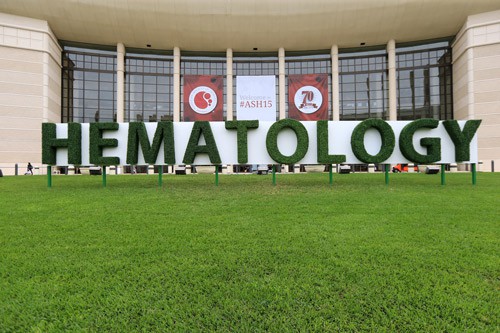
This year’s American Society of Hematology (ASH) conference kicked off in Orlando at the weekend with a host of new trials, including several involving novel therapies for blood cancers.
Novartis’ lead chimeric antigen receptor T-cell (CAR-T) therapy CTL109 was in the spotlight with data from a small study showing an overall response rate (ORR) of 47% in adults with relapsed or refractory diffuse large B-cell lymphoma (DLBCL), and an ORR of 73% in adults with follicular lymphoma (FL).
The 26-patient trial also showed that three patients apiece in the DLBCL and FL arms who had achieved a partial response after three months had converted to a complete response after six months. 12 months into the trial, the results indicate progression-free survival (PFS) for the FL group of 11.9 months, and around three months for the DLBCL group.
CTL109 is an immuno-oncology therapy is based on cells harvested from a patient, which are reprogrammed to seek out and destroy malignant cells. In this case they cells are engineered to recognise B-cells expressing CD19 when re-infused into the patients. Novartis claims to be the first company to have started phase II trials of a CAR-T therapy in the US, Europe, Canada and Australia.
Meanwhile, CAR-T therapy has also been shown for the first time at this year’s ASH to have a therapeutic benefit in multiple myeloma.
A therapy using CAR-T cells modified to bind to B-cell maturation antigen (BCMA) – developed by US government researchers – achieved one remission out of 12 patients in an early-stage trial, with a further six seeing their cancer stabilise, despite all having very extensive disease.
Another interesting new study looked at the role of Roche and AbbVie’s small-molecule BCL-2 inhibitor venetoclax in chronic lymphocytic leukaemia (CLL), an incurable and common form of adult leukaemia.
Venetoclax achieved an ORR of 79% in the phase II trial, which involved patients with relapsed or refractory CLL with 17p deletion mutation, found in around 3% of new CLL cases but up to 50% of those who have failed earlier treatment rounds.
It is a particularly hard form of the disease to treat, so it was also notable that 7.5% of patients experienced a complete response with the drug. Venetoclax has been filed for approval in the US and regulatory submissions in Europe are expected next year.
Turning to acute myeloid leukaemia (AML), Novartis announced the results of a phase III trial of its midostaurin (PKC412) candidate which showed the drug improved overall survival by 23% when added to standard chemotherapy in AML patients whose cancer cells exhibit FLT-3 mutations.
AML is one of the common forms of leukaemia but has had few treatment advances in the last few decades, and as a result has the lowest survival rate. Novartis has previously said it intends to submit the FLT-3 inhibitor before the end of this year and – if approved – midostaurin could become the first-ever targeted therapy for the cancer.
There was also encouraging new data for Takeda’s multiple myeloma therapy Ninlaro (ixazomib; MLN9708), which became the first oral proteasome inhibitor to be approved for marketing in the US last month. It has also been submitted for approval in the EU.
A phase III study reported at ASH revealed that adding ixazomib to lenalidomide and dexamethasone significantly prolonged PFS – without increasing side effects – in patients with relapsed and/or refractory multiple myeloma. The all-oral triplet therapy achieved a 35% improvement in PFS compared to the control group, extending it from just under 15 months to 20.5 months.
Finally, a drug that is already a mainstay of lymphoma treatment – Roche/Biogen’s ant-CD20 antibody Mabthera/Rituxan (rituximab) – has shown at ASH that it can also provide a benefit in patients with ALL.
The GRAALL 2005 trial revealed that in patients with CD20-positive, B-cell precursor ALL – a population which accounts for around a third of all cases – Rituxan was able to extend event-free survival compared to chemotherapy. This is the first randomised trial to test the drug in this setting.




